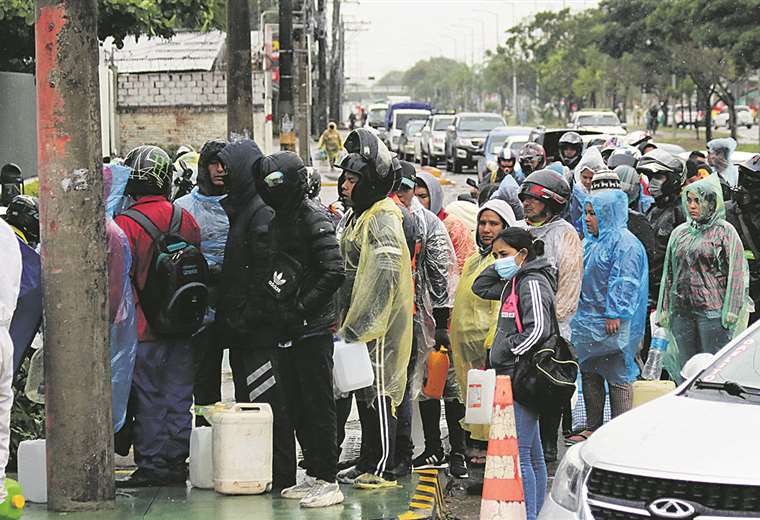November 1, 2022, 4:00 AM
November 1, 2022, 4:00 AM
The extreme and unwavering measure of besieging the department of Santa Cruz undertaken by social and union organizations related to the ruling party ‘hangs’ and leaves defenseless, mainly dairy, poultry and cattle farmers who, in addition to reporting adverse effects on the economy of these sectors, warn that the impossibility of moving their production to slaughterhouses and consumption centers puts at risk the safety of these foods on the table of Santa Cruz and Bolivian families.
Thus, from the Departmental Federation of Milk Producers (Fedeple), President Mauricio Serrate, stated that six days after the fence was activated by radical groups that respond to the current government regime, small producers in this sector stopped deliver some 2 million liters of milk to the industry which, in value, represents around Bs 8 million.
“The damage is not against the businessmen, nor the civic leadership nor the Santa Cruz institutions, they attack the economy of the small dairy producer who in Santa Cruz represents 90% and lives from what he sells per day. The intransigence of preventing the passage of grains and other inputs to feed livestock exposes producers to bankruptcy and exit from productive activity, which will affect food insecurity,” Serrate said, adding that the sector has not yet recovered from the blow of the Covid-19 pandemic, the crisis and high prices of grains and veterinary supplies and drought.
According to the president of the Poultry Farmers Association of Santa Cruz (ADA), Omar Castro, the sectoral situation is critical. He clarified that since the strike began, thanks to efforts made before the Civic Committee, it has been possible to supply the population with chicken and eggs, inside and outside the department, to a greater or lesser extent, and the farms could be reached with balanced for the birds.
However, he noted that, since last Wednesday, the day the siege of Santa Cruz began by radical sectors, the supply is not guaranteed, mainly for the markets in the interior of the country.
“Locally, the fence prevents us from reaching the farms with supplies and balanced, as well as taking the chicken to the slaughterhouses and the eggs to the consumption centers. We have trucks stopped at the places of these fences with chickens dying and eggs in poor condition, because they have not been able to advance from Yapacaní to Cochabamba. In addition, there is dead BB chicken for not having arrived on time at the farms inside and outside the department,” Castro said, indicating that in the last week the average stocking rate of BB chickens on the farm fell from 4.8 to 4 million. . In other words, 800,000 chicks were not loaded, which is highly likely to lead to a shortage of chicken and eggs for the holidays.
Livestock is another productive sector in emergency. According to the president of the Santa Cruz Cattlemen’s Federation (Fegasacruz), Adrián Castedo, due to the intolerance of the people who keep Santa Cruz under siege, the shipment of cattle from Chiquitano municipalities to the slaughter and consumption centers was cut off. Fuel shortages prevent cattle from being transported to the local market.
On top of that, according to the livestock leader, the abrupt cut in meat exports left commitments assumed with Peru, Ecuador and China, markets with which they had commercial negotiations, on hold. “These types of measures damage the country’s image as a reliable supplier,” Castedo noted.
From the Agricultural Chamber of the East, the first vice president José Luis Farah, said that the lack of circulation delays the supply in the mass consumption centers of the region and with the different departments. “This opens up a huge space for speculation, opportunism and smuggling,” he said.
He mentioned that economic losses are notorious in all sectors and that, in some of them, the lack of inputs puts future production at risk, such as poultry and pig farmers, and in others, such as the dairy sector, losses for discarding its production is daily. “The delay in the harvest causes economic losses and the availability of products and, in the case of fruits and vegetables, they rot in trucks,” Farah pointed out.
The extreme measure of the fence is also felt in the Industrial Park of Santa Cruz de la Sierra where drivers from different bus lines block -they claim not to be followers of the MAS- the accesses with stones, tree branches, wires and transport units. The objective is that no truck enters or leaves the industrial center and that work activity is zero.
Sources from companies located in the area of influence of the Park reported that, in some industries, operations are partial, and that in others they took their precautions so that operations are carried out relatively normally. There are 370 companies operating in the Industrial Park that generate more than 7,000 direct jobs, according to data from the Association of Entrepreneurs of the Industrial Park (AEPI).
diesel supply
According to the president of the state-owned oil company YPFB, Armin Dorgathen, 38 tanker trucks were dispatched early Monday to service stations in the city and provinces that operate in the department of Santa Cruz.
“We are making the greatest efforts trying to supply what we are most allowed within logistics. Let’s avoid oversupplying with fuel in drums and bottles because the only thing that is generated is speculation and desperation in the population,” said the president of YPFB.
Dorgathen asked mobilized sectors to put down pressure attitudes to avoid further complications in the supply of liquid fuels and LPG in Santa Cruz. Yesterday, the state-owned oil company filed a criminal complaint against people who carried out acts of vandalism near the Guillermo Elder Bell refinery.
From the Association of Suppliers of Santa Cruz (Asosur), President Nicolás Maldonado ratified the departure of the 38 tank trucks from the Guillermo Elder Bell refinery, although he stated that the volume dispatched will be enough to cover the demand for one day of fuel in the refinery. city. He noted that the minimum necessary is sold in drums (Bs 20), this to avoid resale and speculation on fuel prices.
From the Association of Oilseeds and Wheat Producers, President Fidel Flores stated that the lack of diesel is putting at risk the harvest of 400,000 hectares of soybeans planted in the winter campaign and the production of strategic foods (soybeans, corn and sorghum). ), whose projection for the summer campaign is 1.3 million hectares, affecting more than 14,000 farmers in the production chain, of which 80% are small.
“The country’s food security is being put at risk, not only in the short term, but also next year,” Flores hinted.
Impact on the export sector
From the general management of the Chamber of Exporters, Logistics and Investment Promotion (Cadex), Martín Salces, sees a slowdown in the growth rate of exports, which were leveraging Bolivia’s economic recovery. “If the situation worsens, this could lead to an increase in unemployment and, due to the conditions that are taking place, inflation would skyrocket, affecting the most impoverished sectors of Bolivia,” he noted.
He insinuated that the strike, the blockades and the siege of Santa Cruz have implied delays in the production processes to meet the volumes to be exported and the breakdown of the logistics chain.


















